-
 Bitcoin
Bitcoin $115200
0.74% -
 Ethereum
Ethereum $3730
6.71% -
 XRP
XRP $3.075
4.85% -
 Tether USDt
Tether USDt $1.000
0.01% -
 BNB
BNB $766.1
1.85% -
 Solana
Solana $168.7
4.22% -
 USDC
USDC $0.9999
0.00% -
 Dogecoin
Dogecoin $0.2097
5.42% -
 TRON
TRON $0.3327
1.72% -
 Cardano
Cardano $0.7547
4.04% -
 Stellar
Stellar $0.4156
4.83% -
 Hyperliquid
Hyperliquid $38.77
1.37% -
 Sui
Sui $3.589
4.15% -
 Chainlink
Chainlink $17.09
4.86% -
 Bitcoin Cash
Bitcoin Cash $574.6
5.82% -
 Hedera
Hedera $0.2523
1.95% -
 Avalanche
Avalanche $23.01
7.68% -
 Ethena USDe
Ethena USDe $1.001
-0.02% -
 Litecoin
Litecoin $120.4
9.83% -
 Toncoin
Toncoin $3.426
-4.06% -
 UNUS SED LEO
UNUS SED LEO $8.918
-0.53% -
 Shiba Inu
Shiba Inu $0.00001250
2.49% -
 Uniswap
Uniswap $9.956
8.52% -
 Polkadot
Polkadot $3.724
3.26% -
 Monero
Monero $304.7
0.19% -
 Dai
Dai $0.9999
-0.01% -
 Bitget Token
Bitget Token $4.394
1.48% -
 Cronos
Cronos $0.1400
6.96% -
 Pepe
Pepe $0.00001076
2.83% -
 Aave
Aave $268.4
3.45%
Can tickets for virtual events in the Metaverse be issued through NFT?
NFTs offer secure, verifiable Metaverse event tickets, eliminating counterfeiting via blockchain technology and smart contracts; however, scalability and smart contract security remain challenges for widespread adoption.
Mar 15, 2025 at 05:40 am
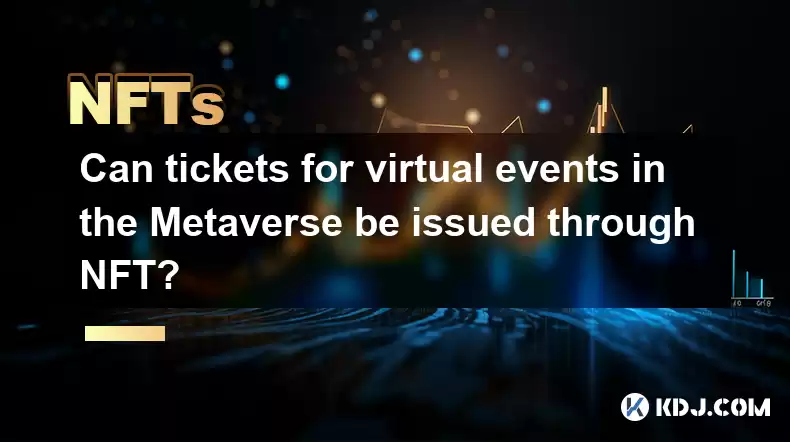
Key Points:
- NFTs offer a unique solution for ticketing virtual events in the Metaverse, providing verifiable ownership and eliminating counterfeiting.
- The process involves creating unique NFTs representing event tickets, which are then sold or distributed to attendees.
- Smart contracts can automate ticket distribution, access control, and even secondary market sales.
- Security concerns and scalability issues remain challenges in widespread NFT ticketing adoption.
- The integration with existing ticketing platforms and metaverse platforms is crucial for successful implementation.
Can tickets for virtual events in the Metaverse be issued through NFT?
Yes, tickets for virtual events in the Metaverse can be issued through NFTs (Non-Fungible Tokens). This innovative approach leverages the blockchain's immutable ledger to create secure, verifiable, and unique tickets. Unlike traditional digital tickets, which are easily duplicated and forged, NFTs provide a tamper-proof record of ownership. This solves a major problem in the virtual events space – ticket fraud.
The process of issuing NFT tickets involves several steps. First, a unique NFT is created for each ticket. This NFT might contain embedded information, such as the event date, time, venue (in the Metaverse), and the attendee's name or wallet address. These details are permanently recorded on the blockchain. The design of the NFT can also be unique, adding a collectible element.
Next, these NFTs are then sold or distributed to attendees. This can be done through various NFT marketplaces or directly through the event organizer's website. The payment can be made in cryptocurrency, broadening the options for ticket buyers. The transaction itself is recorded on the blockchain, providing a transparent and auditable record.
Smart contracts play a vital role in automating various aspects of NFT ticketing. These self-executing contracts can automatically grant access to the event upon verification of NFT ownership. They can also handle secondary market sales, allowing ticket holders to resell their NFTs on marketplaces. This adds flexibility and liquidity to the ticketing system.
While the use of NFTs for virtual event ticketing presents many advantages, there are also challenges. One significant concern is the scalability of the blockchain. Processing a large number of NFT transactions for a major virtual event could strain the network, leading to high gas fees and slow transaction times. Choosing the right blockchain and potentially utilizing layer-2 scaling solutions is critical.
Another challenge relates to the security of the smart contracts used. Bugs or vulnerabilities in the smart contracts could be exploited, leading to unauthorized access or the loss of tickets. Thorough auditing and testing of smart contracts are essential to mitigate these risks. Furthermore, the user experience needs careful consideration. Many potential attendees might lack familiarity with cryptocurrencies and NFTs, creating a barrier to entry.
The integration of NFT ticketing systems with existing ticketing platforms and metaverse platforms is crucial for widespread adoption. Seamless integration will enhance the user experience and make it easier for event organizers to manage their ticketing operations. This also includes the integration of payment gateways that support cryptocurrencies.
Furthermore, the regulatory landscape surrounding NFTs and cryptocurrencies is still evolving. Different jurisdictions have varying regulations, which could affect the legality and practicality of using NFTs for ticketing. Organizers need to be aware of the relevant regulations in their operating region. The choice of blockchain is also critical, impacting factors like transaction speed, cost, and environmental impact.
Common Questions and Answers:
Q: What are the benefits of using NFTs for virtual event tickets?
A: NFTs offer several advantages, including verifiable ownership, preventing counterfeiting and fraud, secure access control via smart contracts, and the potential for creating collectible and tradable tickets.
Q: How do I buy an NFT ticket for a virtual event?
A: The process usually involves creating a digital wallet compatible with the blockchain used for the NFT, acquiring cryptocurrency to make the purchase, and then purchasing the NFT from the event organizer or a marketplace.
Q: Can I resell my NFT ticket after purchasing it?
A: This depends on the smart contract governing the NFT. Many NFT tickets are designed to be transferable, allowing you to resell them on secondary marketplaces, although the event organizer might impose restrictions.
Q: What if I lose my NFT ticket?
A: Because NFTs are recorded on the blockchain, losing access to your digital wallet doesn't necessarily mean you lose your ticket. However, regaining access might be complex, depending on the security measures in place. It's crucial to keep your seed phrase secure.
Q: Are NFT tickets more expensive than traditional tickets?
A: The price of NFT tickets can vary widely depending on the event, the rarity of the NFT, and market demand. They may be more or less expensive than traditional tickets.
Q: What blockchains are commonly used for NFT ticketing?
A: Several blockchains are used, including Ethereum, Polygon, and Flow. The choice depends on factors like transaction fees, speed, and scalability.
Q: What if the event is canceled? What happens to my NFT ticket?
A: The handling of refunds or compensation in case of event cancellation is determined by the terms and conditions set by the event organizer and reflected in the smart contract. It’s vital to review these terms before purchasing the ticket.
Q: Are there any environmental concerns associated with using NFTs for ticketing?
A: Some blockchains used for NFTs have higher energy consumption than others. The environmental impact varies depending on the blockchain chosen and the methods used to mitigate energy usage. Organizers may choose environmentally friendly blockchains to reduce their carbon footprint.
Q: What are the security risks associated with NFT tickets?
A: Security risks include smart contract vulnerabilities, phishing scams, and the potential for loss of access to your digital wallet. It's crucial to use reputable platforms and take precautions to protect your digital assets.
Disclaimer:info@kdj.com
The information provided is not trading advice. kdj.com does not assume any responsibility for any investments made based on the information provided in this article. Cryptocurrencies are highly volatile and it is highly recommended that you invest with caution after thorough research!
If you believe that the content used on this website infringes your copyright, please contact us immediately (info@kdj.com) and we will delete it promptly.
- Cryptocurrency, Altcoins, and Profit Potential: Navigating the Wild West
- 2025-08-04 14:50:11
- Blue Gold & Crypto: Investing Disruption in Precious Metals
- 2025-08-04 14:30:11
- Japan, Metaplanet, and Bitcoin Acquisition: A New Era of Corporate Treasury?
- 2025-08-04 14:30:11
- Coinbase's Buy Rating & Bitcoin's Bold Future: A Canaccord Genuity Perspective
- 2025-08-04 14:50:11
- Coinbase's Buy Rating Maintained by Rosenblatt Securities: A Deep Dive
- 2025-08-04 14:55:11
- Cryptos, Strategic Choices, High Returns: Navigating the Meme Coin Mania
- 2025-08-04 14:55:11
Related knowledge
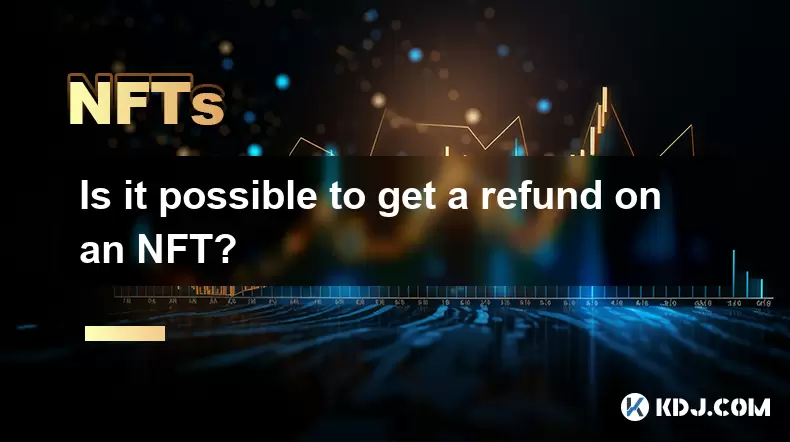
Is it possible to get a refund on an NFT?
Jul 21,2025 at 08:35pm
Understanding NFT Transactions and RefundsWhen you purchase an NFT (Non-Fungible Token), the transaction is typically recorded on a blockchain, making...
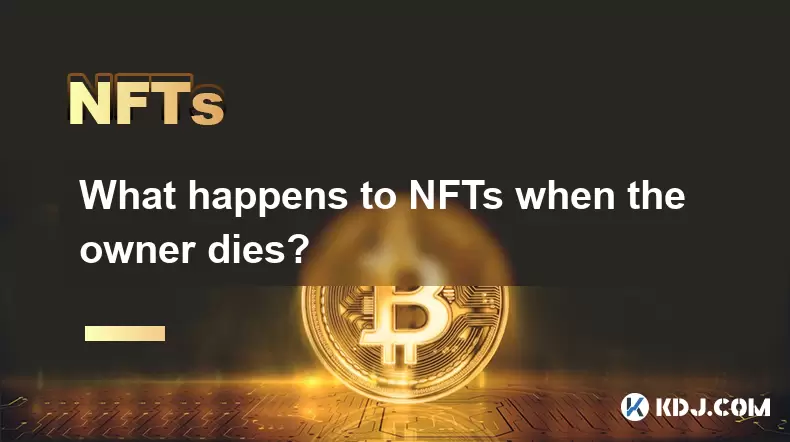
What happens to NFTs when the owner dies?
Jul 22,2025 at 02:43pm
Legal Ownership and Digital AssetsWhen an individual owns NFTs, the question of what happens to these assets upon their death is a pressing one. NFTs ...
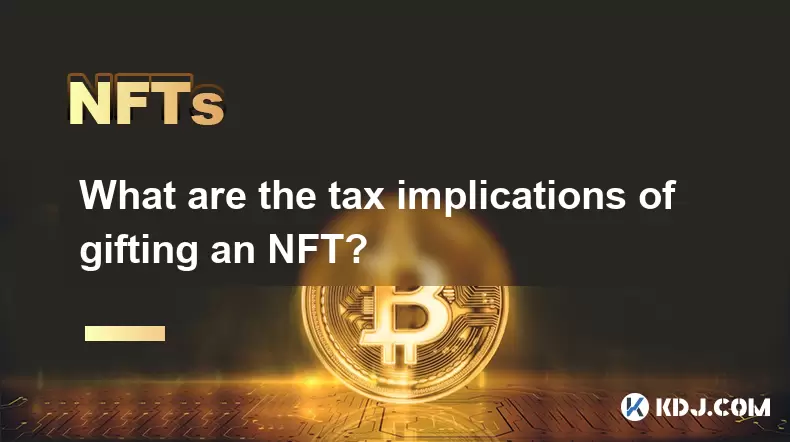
What are the tax implications of gifting an NFT?
Jul 19,2025 at 04:21am
Understanding the Basics of NFT GiftingGifting a Non-Fungible Token (NFT) involves transferring ownership from one individual to another without recei...
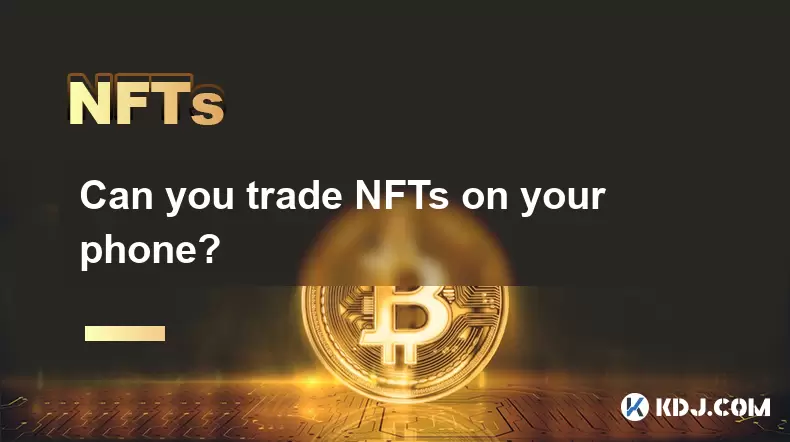
Can you trade NFTs on your phone?
Jul 18,2025 at 04:29am
Trading NFTs on Mobile DevicesYes, you can trade NFTs on your phone, and the process has become increasingly streamlined thanks to a variety of mobile...
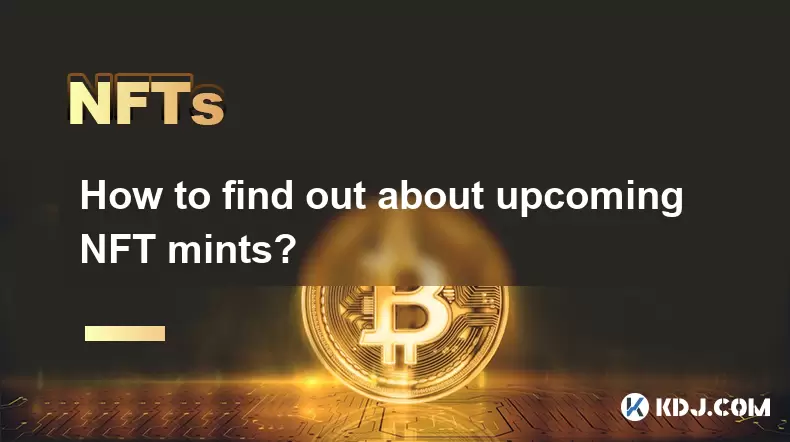
How to find out about upcoming NFT mints?
Jul 18,2025 at 11:50am
Exploring NFT Minting OpportunitiesUnderstanding the landscape of upcoming NFT mints is crucial for collectors, investors, and creators who wish to st...
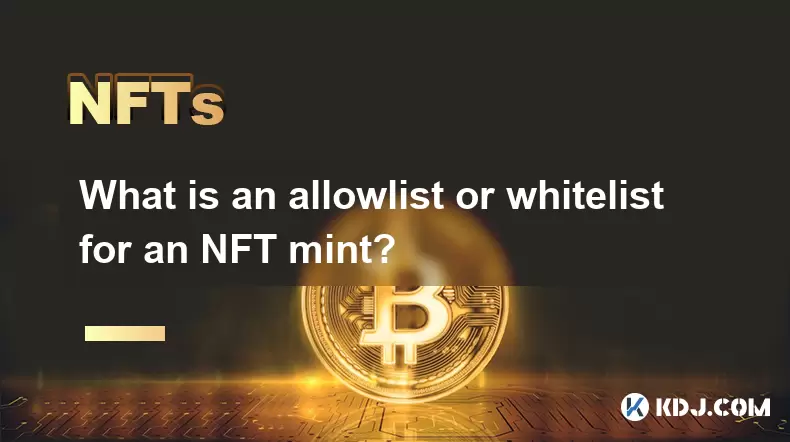
What is an allowlist or whitelist for an NFT mint?
Jul 20,2025 at 07:14pm
Understanding the Concept of an Allowlist for NFT MintingAn allowlist, also commonly referred to as a whitelist, is a mechanism used in the NFT mintin...

Is it possible to get a refund on an NFT?
Jul 21,2025 at 08:35pm
Understanding NFT Transactions and RefundsWhen you purchase an NFT (Non-Fungible Token), the transaction is typically recorded on a blockchain, making...

What happens to NFTs when the owner dies?
Jul 22,2025 at 02:43pm
Legal Ownership and Digital AssetsWhen an individual owns NFTs, the question of what happens to these assets upon their death is a pressing one. NFTs ...

What are the tax implications of gifting an NFT?
Jul 19,2025 at 04:21am
Understanding the Basics of NFT GiftingGifting a Non-Fungible Token (NFT) involves transferring ownership from one individual to another without recei...

Can you trade NFTs on your phone?
Jul 18,2025 at 04:29am
Trading NFTs on Mobile DevicesYes, you can trade NFTs on your phone, and the process has become increasingly streamlined thanks to a variety of mobile...

How to find out about upcoming NFT mints?
Jul 18,2025 at 11:50am
Exploring NFT Minting OpportunitiesUnderstanding the landscape of upcoming NFT mints is crucial for collectors, investors, and creators who wish to st...

What is an allowlist or whitelist for an NFT mint?
Jul 20,2025 at 07:14pm
Understanding the Concept of an Allowlist for NFT MintingAn allowlist, also commonly referred to as a whitelist, is a mechanism used in the NFT mintin...
See all articles

























































































